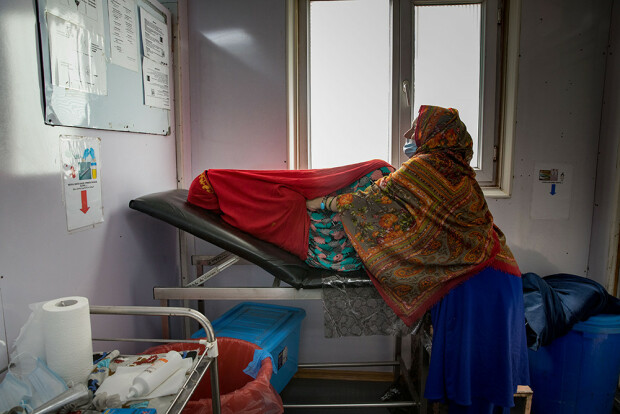
Greetings from Khost, Afghanistan
Greetings from Khost, Afghanistan
(7 January 2013)
On 20 December 2012, the day the world was supposed to end, according to the Mayans, I arrived in a snow-covered Kabul. It gives me poetic justice vibe. When I told my Pakistani colleagues, whom I had worked with last year, that I was going to Afghanistan, their reaction was, "Dr Séverine, don't trust the Afghans. They are difficult people."
During the car ride from the airport to downtown Kabul, I struck up a conversation with the Afghan driver. When he learned that I had worked in Pashtun areas of Pakistan last year, he said, "Don't trust the Pakistanis. They are difficult people." Border rivalries exist in every culture.
He added, "And by the way, the Pashtun area is ours. It's Afghanistan, and we are going to take it back soon." With a big smile, I replied, "Hopefully not next month while I'm there because I like peace."
Before my departure to Afghanistan, I had to wait for a few days for my visa in Dubai. The difference with Khost could not be bigger… Everything is grand in Dubai, the world's largest shopping center, a metro that arrives at the same shopping center, and the only 7-star hotel in the world. It's a world where you see women walking around in the strange combination of a burqa, Louis Vuitton bags, and Ray-Ban sunglasses, while sheikhs sport the latest iPhone models. Dubai is very tolerant; you can do whatever you want there. You can get (expensive) alcohol, and you occasionally see someone smoking. It's a kind of Islam-light, which sharply contrasts with the hardcore version I got to witness here in Khost.
Our hospital in Khost itself is an oasis of peace amidst war, at least for women and babies. I have never seen so many women with their 12th, 13th, or 14th pregnancy. Family planning is a sensitive issue here. It's discussable, but ultimately the husband decides. Moreover, Afghans primarily desire sons, which becomes evident immediately after birth. A son receives more attention and better nourishment than a girl.
Yesterday, the Afghan doctor, Shafiqa, was very angry with a patient. When asked how many children she had, the patient replied, "One." It turned out she actually had six children—five girls and one boy. But for her, only the boy was worth mentioning.
Even for Shafiqa, who grew up as a woman in this highly male-dominated culture, this was very confronting.
Another patient was pregnant with her 12th child, of which 10 were alive. She needed a cesarean section. When we asked her if she wanted sterilisation, she replied, "Every day, children die in Afghanistan due to war or bombings. How can I choose sterilisation?" Perhaps she has a point. This country has been at war for 30 years—first the Russians, then the Taliban, and now the Americans. These people have been through a lot.
Opening a Doctors Without Borders hospital in Afghanistan with 15 to 20 deliveries per day is an absolute challenge. The Afghan colleagues are so motivated that it's touching, and most of them are delighted to have a job. Unfortunately, education, especially for girls (and all midwives and cleaners are women), is very limited, and their knowledge of English is rudimentary. Learning Pashto and using sign language is the message for us expatriates.
What people experience here borders on the incredible. Currently, we have Zakia admitted—she has a daughter of 4 years who is alive, three children who died in her womb, and now, on the ultrasound, a baby of 9 months with excessive amniotic fluid. The baby didn't seem entirely normal. Five pregnancies, only one child alive. Due to a previous cesarean section and the baby being in a transverse position this time, a normal delivery was not an option. So, a cesarean section for a child, for whom we hope, even more than usual, that it is healthy. Fate had a different plan. Our pediatrician suspects the baby has Down syndrome. A girl with Down syndrome in Afghanistan—the future of this child didn’t bode very well.
One day after her cesarean section, the mother walks cautiously. She is sad, but she accepts her situation. "It is the will of Allah."
Women with sick, disabled, or stillborn children don't want to be in a separate ward here. In Belgium, we place them in a room where they won't be confronted with healthy babies. But in Afghanistan, mothers feel excluded if they are separated.
Next to Zakia lies Rehana, overjoyed, with her healthy twins. A girl and a boy—yet she gives the impression of loving the girl just as much. Even in the recovery room, one hour after the cesarean section, she stammered, “My daughter, my daughter.”
The cesarean section, as is often the case in obstetrics, took place at night. I warm myself with a cup of tea in the recovery room next to the patient. The cleaning lady is diligently and enthusiastically scrubbing the floor of the operating room and even the walls (although it’s hardly necessary at 1am), but my Pashto is not good enough to explain her that.
It reminded me of the inspiring story of the NASA janitor. When John Kennedy visited the NASA facility in 1962 and asked the janitor what his job was, he replied, "Mr President, I'm helping to put a man on the moon." Perhaps this Afghan cleaning lady, who cannot read or write and doesn't speak a word of English, also feels the same: "I'm helping to save babies."
Séverine